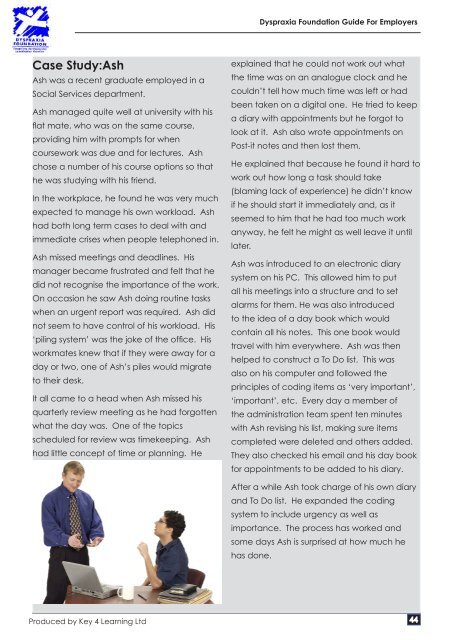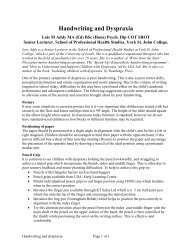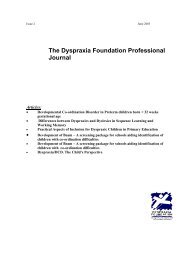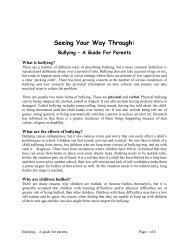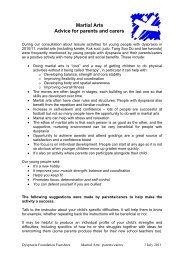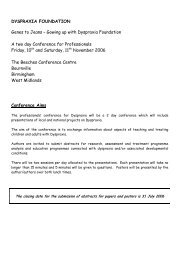Employers Guide - Dyspraxia Foundation
Employers Guide - Dyspraxia Foundation
Employers Guide - Dyspraxia Foundation
You also want an ePaper? Increase the reach of your titles
YUMPU automatically turns print PDFs into web optimized ePapers that Google loves.
<strong>Dyspraxia</strong> <strong>Foundation</strong> <strong>Guide</strong> For <strong>Employers</strong><br />
Case Study:Ash<br />
Ash was a recent graduate employed in a<br />
Social Services department.<br />
Ash managed quite well at university with his<br />
flat mate, who was on the same course,<br />
providing him with prompts for when<br />
coursework was due and for lectures. Ash<br />
chose a number of his course options so that<br />
he was studying with his friend.<br />
In the workplace, he found he was very much<br />
expected to manage his own workload. Ash<br />
had both long term cases to deal with and<br />
immediate crises when people telephoned in.<br />
Ash missed meetings and deadlines. His<br />
manager became frustrated and felt that he<br />
did not recognise the importance of the work.<br />
On occasion he saw Ash doing routine tasks<br />
when an urgent report was required. Ash did<br />
not seem to have control of his workload. His<br />
‘piling system’ was the joke of the office. His<br />
workmates knew that if they were away for a<br />
day or two, one of Ash’s piles would migrate<br />
to their desk.<br />
It all came to a head when Ash missed his<br />
quarterly review meeting as he had forgotten<br />
what the day was. One of the topics<br />
scheduled for review was timekeeping. Ash<br />
had little concept of time or planning. He<br />
explained that he could not work out what<br />
the time was on an analogue clock and he<br />
couldn’t tell how much time was left or had<br />
been taken on a digital one. He tried to keep<br />
a diary with appointments but he forgot to<br />
look at it. Ash also wrote appointments on<br />
Post-it notes and then lost them.<br />
He explained that because he found it hard to<br />
work out how long a task should take<br />
(blaming lack of experience) he didn’t know<br />
if he should start it immediately and, as it<br />
seemed to him that he had too much work<br />
anyway, he felt he might as well leave it until<br />
later.<br />
Ash was introduced to an electronic diary<br />
system on his PC. This allowed him to put<br />
all his meetings into a structure and to set<br />
alarms for them. He was also introduced<br />
to the idea of a day book which would<br />
contain all his notes. This one book would<br />
travel with him everywhere. Ash was then<br />
helped to construct a To Do list. This was<br />
also on his computer and followed the<br />
principles of coding items as ‘very important’,<br />
‘important’, etc. Every day a member of<br />
the administration team spent ten minutes<br />
with Ash revising his list, making sure items<br />
completed were deleted and others added.<br />
They also checked his email and his day book<br />
for appointments to be added to his diary.<br />
After a while Ash took charge of his own diary<br />
and To Do list. He expanded the coding<br />
system to include urgency as well as<br />
importance. The process has worked and<br />
some days Ash is surprised at how much he<br />
has done.<br />
Produced by Key 4 Learning Ltd


